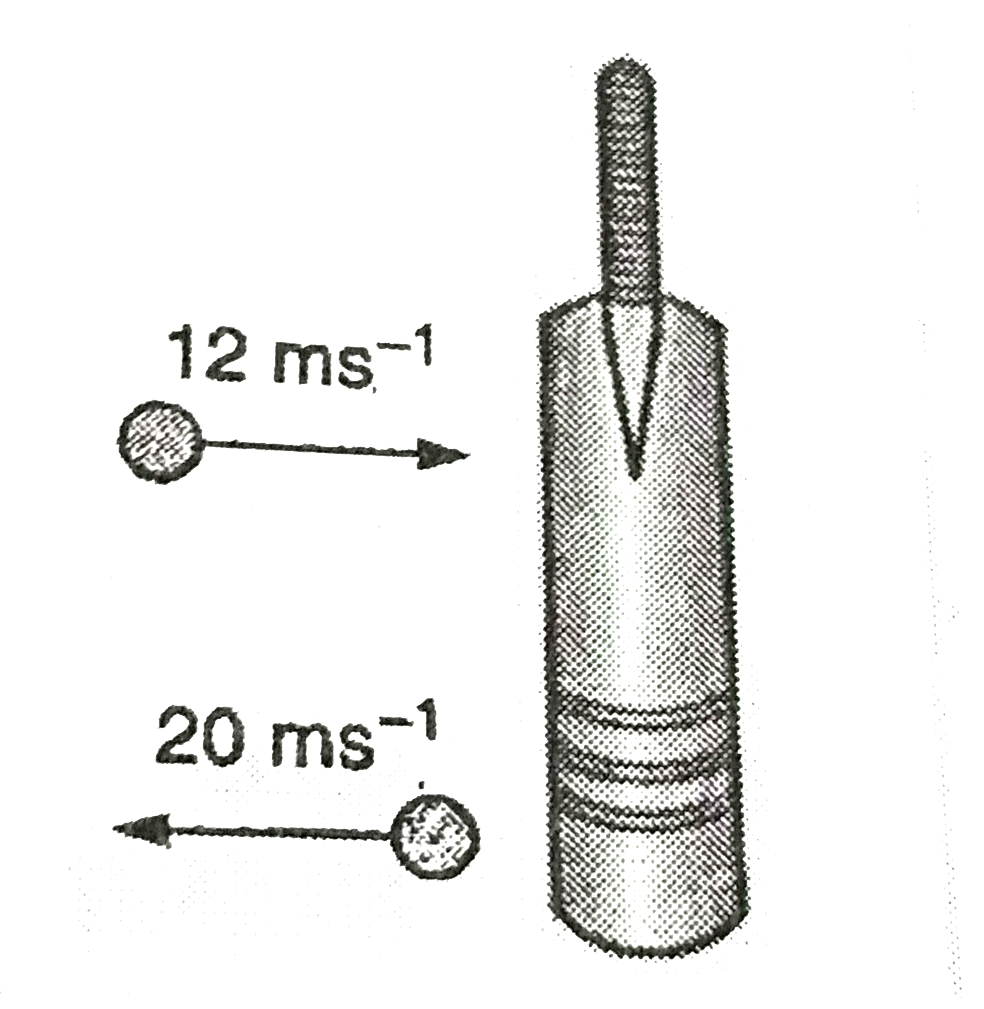A ball of mass 10g is initially moving with a velocity of On applying a constant force a ball for 2.0s, it acquires a velocity of calculate
the final momentum of ball
To solve the problem of calculating the final momentum of a ball, we can follow these steps:
Step 1: Identify the given values
- Mass of the ball (m) = 10 g
- Initial velocity (u) = 50 m/s
- Final velocity (v) = 70 m/s
- Time (t) = 2.0 s (not directly needed for momentum calculation)
Step 2: Convert mass from grams to kilograms
Since the standard unit of mass in the SI system is kilograms, we need to convert the mass from grams to kilograms:
m=10 g=101000 kg=0.01 kg
Step 3: Use the formula for momentum
The formula for momentum (p) is given by:
p=m×v
where:
- p is the momentum,
- m is the mass,
- v is the velocity.
Step 4: Substitute the values into the momentum formula
Now we can substitute the values we have:
pf=m×vf
pf=0.01 kg×70 m/s
Step 5: Calculate the final momentum
Now we perform the multiplication:
pf=0.01×70=0.7 kg m/s
Final Answer
The final momentum of the ball is:
Final Momentum=0.7 kg m/s
---
- Mass of the ball (m) = 10 g
- Initial velocity (u) = 50 m/s
- Final velocity (v) = 70 m/s
- Time (t) = 2.0 s (not directly needed for momentum calculation)
Since the standard unit of mass in the SI system is kilograms, we need to convert the mass from grams to kilograms:
m=10 g=101000 kg=0.01 kg
The formula for momentum (p) is given by:
p=m×v
where:
- p is the momentum,
- m is the mass,
- v is the velocity.
Now we can substitute the values we have:
pf=m×vf
pf=0.01 kg×70 m/s
Now we perform the multiplication:
pf=0.01×70=0.7 kg m/s
The final momentum of the ball is:
Final Momentum=0.7 kg m/s
Topper's Solved these Questions
- FORCE AND LAWS OF MOTIONBOOK - MTG IIT JEE FOUNDATIONCHAPTER - FORCE AND LAWS OF MOTIONEXERCISE - SOLVED EXAMPLES
13 Videos
- FORCE AND LAWS OF MOTIONBOOK - MTG IIT JEE FOUNDATIONCHAPTER - FORCE AND LAWS OF MOTIONEXERCISE - NCERT SECTION
37 Videos
- FOOTSTEPS TOWARDS NEETBOOK - MTG IIT JEE FOUNDATIONCHAPTER - FOOTSTEPS TOWARDS NEETEXERCISE - Multiple Choice Question
45 Videos
- GRAVITATION BOOK - MTG IIT JEE FOUNDATIONCHAPTER - GRAVITATION EXERCISE - Olympiad/HOTS Corner
20 Videos
Similar Questions
A ball of mass 10g is initially moving with a velocity of 50ms−1 On applying a constant force a ball for 2.0s, it acquires a velocity of 70ms−1 calculate
the initial momentum of ball
View SolutionA ball of mass 25 g, moving with a velocity of 2ms−1 is stopped within 5 cm. The average resistance offered to the ball is
View Solution
Knowledge Check
A ball of mass 0.2 kg moves with a velocity of 20m/sec and it stops in 0.1 sec , then the force on the ball is
A40 NB20 NC4 ND2 NA body of mass 100 g is moving with a velocity of 15 m/s. The momentum associated with the ball will be
A0.5 kg m/sB1.5 kg m/sC2.5 kg m/sD3.2 NsA ball of mass 0.5 kg is moving with a velocity of 2ms−1. It if subjected to a force of x Newton for 2s. Because of this force, the ball moves with a velocity of 3ms−1 . The value of x is :
A5NB8.25NC0.25ND1N
A bicycle initially moving with a velocity 5.0 ms−1 accelerates for 5 s at a rate of 2 ms−2. What will be its final velocity?
View SolutionA ball of mass 0.1 kg is thrown against a wall. It strikes the wall normally with a velocity of 30 ms−1 and rebounds with a velocity of 20 ms−1. Calculate the impulse of the force exerted by the wall.
View SolutionA ball of mass 1 kg moving with a velocity of 0.4 ms−1 collides with another stationary ball. After the collision, the first ball moves with a velocity of 0.3ms1 in a direction making an angle of 90∘ with its initial direction. The momentum of the second ball after the collision will be (in kg ms−1)
View SolutionA cricket ball of mass 150 g is moving with a speed of 12ms−1 and is hit by a bat so that the ball is turned back with velocity of 20ms−1 if duration of contact between bat and ball is 0.01 s then:

View SolutionA cricket ball of mass 150g is moving with a velocity of 12 m/s and is hit by a bat so that the ball is turned back with a velocity ishit by a bat so that the ball is turned back with a velocity of 20 m/s. The force of blow acts for 0.01 s on the ball. What is the averate force exerted by the bat on the ball?
View Solution
